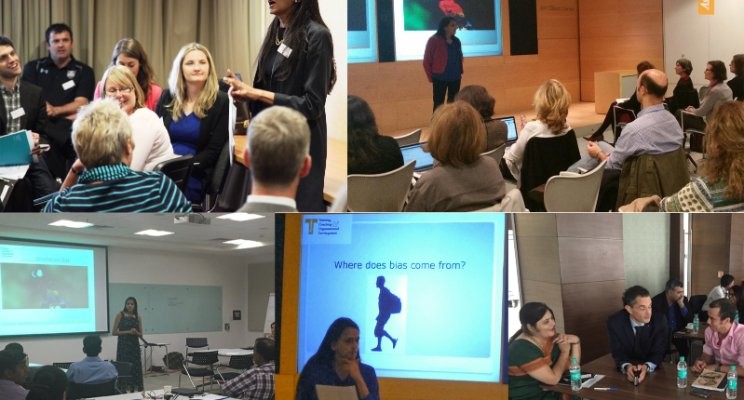
Are you conscious of your unconscious bias?
What's in your Backpack?
In the last two months, I have had the huge privilege to visit eight cities around the world to deliver workshops on our unconscious bias. The cities were Philadelphia, Madrid, London, Delhi, Chennai, Bombay, Bangalore and Cochin. The reason I specify the cities is that each of these cities are very different in their own way. They have their own cuisine, culture, language and norms. Does that have an impact on our biases, both conscious and unconscious?
I would like to share eight stories from the eight cities.
Delhi: There was the story of the Sikh gentleman (very successful business man) dressed in modest traditional Indian attire. He arrives at the airport to catch a flight and the staff assume he cannot speak English and had probably never flown so take great pains to explain things to him.
Philadelphia: The one about the thirty something woman at work berated by her male friend & colleague for being too aggressive at a meeting; yet applauding his male colleague for being strong and assertive to make a point.
Cochin: The senior male HR person told by his female boss that he would not be promoted to her position when she leaves as he is a man and they need a woman for the role of HR director
London: The story of the American recently moved to London who was told loudly and publicly at work “ we don’t use words like y’all in the UK”
Chennai: The young woman from tribal Meghalaya (who looks and sounds different to those from Chennai) who arrived in Chennai to work and very quickly changed her Meghalaya Indian accent to an American one, so people would think she was from America.
Bombay: The French man working in China was accused of being unfriendly and rude to his local Chinese colleagues when in actual fact he felt he was just behaving normally as he always does in a work situation in the west.
Madrid: The story of the woman recently returned from maternity leave to be told that the project she should have got has been handed to a male colleague as it was felt she needed a lighter load on her return
Bangalore: Or what about the story of the young boy in a Boys school who was playing around, throwing scrunched up bits of paper during a formal assembly and was hauled up on stage to kneel in front of the whole school for the rest of the assembly.
I mentioned the cities to make a point. But what if I told you, all the stories were true but the cities were jumbled up. Does it actually matter?
How did these 8 people feel at the time and what kind of unconscious biases could they now have due to their experiences?
Unconscious Bias is just that – it’s a bias we have but we don’t know we have it. More often than not, theses biases occur due to a negative experience. It’s natural human nature that we remember our negative stories. These stories go into our metaphorical backpack and we carry it with us wherever we go.
Here are 8 possible outcomes for these 8 people.
Delhi: The Sikh gentleman is very offended and berates the staff. He chooses never to fly that airline again
Philadelphia: The young woman loses her self-confidence and doesn’t speak up at meetings. Her male colleagues do better at work and get promoted faster.
Cochin: The male HR colleague leaves that company and starts afresh with another organisation. He is now an HR director.
London: The American works doubly hard to change the way she speaks at work and never fully fits in with her colleagues
Chennai: The woman from Meghalaya is always over compensating to fit in with her colleagues. She sees herself as an outsider, no matter what. She is never completely relaxed at work.
Bombay: The French man tries to reduce his work commitments in China and ends up not being as successful as he could have been
Madrid: The woman makes a formal complaint against her boss for gender discrimination.
Bangalore: The young boy grows to be an adult who hates authority and fights it at all costs. He finds it very hard to work in a hierarchical system and ends up starting his own business.
Eight stories with eight possible outcomes. All of them as a direct result of the individuals unconscious bias.
All these stories are familiar to any one in any part of the world. The Philadelphia story could have happened in Chennai and the Delhi story could have happened in London.
The point is, we carry our backpacks around with us with the heavy weight of biases that we don’t know we have. How about having the courage to unzip the backpack and take a peek inside?
Business analyst,In love with technology, movies and art. TED talks fan
7ybrilliant.
somehow " Thinking Fast and Slow" is coming to my mind
Career Transition Coach and Author
7ybackpack is really true and we never get to see when it is loaded on your back. at best you perceive the load, which you soon get used to.
I work with clients to identify and communicate their value, prioritising quality over price.
7ySmita, I loved this for the mere fact that you illustrated these biases with powerful everyday stories. We are hardwired with our biases. I think it is only with articles and workshops like these can the awareness and then the behaviour change. Wonderful stuff.
Director of Diversity, Inclusion, and Belonging - Charter.
7yagreed Sikhs story in Delhi is so true...